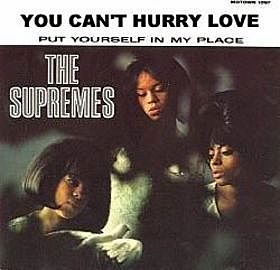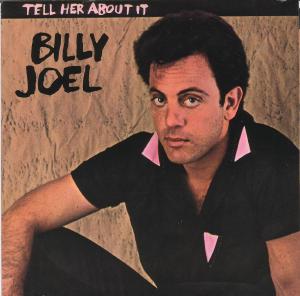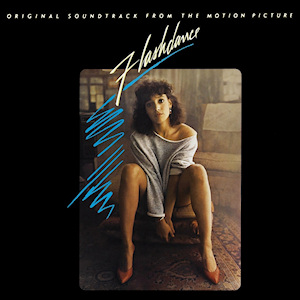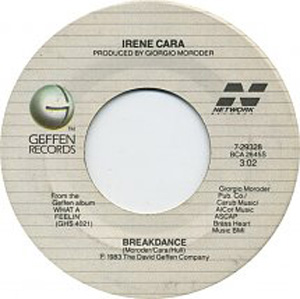
Flashdance is a 1983 American romantic drama dance film directed by Adrian Lyne and starring Jennifer Beals as a passionate young dancer, Alex Owens, who aspires to become a professional ballerina, alongside Michael Nouri, who plays her boyfriend and the owner of the steel mill where she works by day in Pittsburgh. It was the first collaboration of producers Don Simpson and Jerry Bruckheimer, and the presentation of some sequences in the style of music videos was an influence on other 1980s films including Footloose, Purple Rain, and Top Gun, Simpson and Bruckheimer's most famous production. It was also one of Lyne's first major film releases, building on television commercials. Alex's elaborate dance sequences were shot using body doubles.

Michael Andrew Sembello is an American singer, guitarist, keyboardist, songwriter, composer and producer from Philadelphia, Pennsylvania.

"Back in My Arms Again" is a 1965 song recorded by The Supremes for the Motown label.

"You Can't Hurry Love" is a 1966 song originally recorded by the Supremes on the Motown label. It was released on July 25, 1966 as the second single from their studio album The Supremes A' Go-Go (1966).

"Everybody Hurts" is a song by American rock band R.E.M. from their eighth studio album, Automatic for the People (1992), and released as a single in April 1993 by Warner Bros. Records. It peaked at number 29 on the US Billboard Hot 100, but fared much better on the US Cash Box Top 100, where it peaked at number 18. The song also reached the top 10 on the charts of Australia, Canada, France, Iceland, Ireland, the Netherlands, and the United Kingdom. Its music video was directed by Jake Scott and filmed in San Antonio, Texas. In 2003, Q ranked "Everybody Hurts" at number 31 on their list of the "1001 Best Songs Ever", and in 2005, Blender ranked the song at number 238 on their list of "Greatest Songs Since You Were Born".

"Man on the Moon" is a song by American alternative rock band R.E.M., released in November 1992 as the second single from their eighth album, Automatic for the People (1992). The lyrics were written by lead singer Michael Stipe, and the music by drummer Bill Berry and guitarist Peter Buck. The song was well received by critics and reached number 30 on the US Billboard Hot 100, number 17 on the US Cash Box Top 100, number 18 on the UK Singles Chart, and number one in Iceland. It remains one of R.E.M.'s most popular songs and was included on the compilations In Time: The Best of R.E.M. 1988–2003 and Part Lies, Part Heart, Part Truth, Part Garbage 1982–2011.

"Flashdance... What a Feeling" is a song from the 1983 film Flashdance with music by Giorgio Moroder and lyrics by Keith Forsey and the song's performer, Irene Cara. The song spent six weeks at number one on the Billboard Hot 100 and topped the charts around the world. It was awarded Gold certification by the Recording Industry Association of America for sales of one million copies and won the Academy Award and Golden Globe for Best Original Song and earned Cara the Grammy Award for Best Female Pop Vocal Performance. In 2023, the song was chosen by the Library of Congress for inclusion in the National Recording Registry.

"The Woman in Me" is a song by American singer Donna Summer, released as the third and final single from her eponymous tenth studio album (1982). The song reached number 33 on the Billboard Hot 100, number 30 on the Black Singles chart, and number 17 on the Adult Contemporary chart in early 1983. It was written by John Bettis of Carpenters fame.

"Maniac" is a song from the 1983 film Flashdance that was written by Dennis Matkosky and its performer, Michael Sembello. The original idea for the song came to Matkosky while watching a news report on a serial killer, which inspired gruesome lyrics that he and Sembello expanded upon after finding a 1980 horror film with the same name. When Flashdance director Adrian Lyne grew attached to the demo of the song used during filming, his music supervisor Phil Ramone requested lyrics more appropriate for their story of a dancer and worked with Sembello to produce a new version for the soundtrack. The new recording was used for a scene in which protagonist Alexandra Owens trains rigorously at home.
Keith Forsey is an English pop musician and record producer.

What a Feelin' is the second studio album by American singer-songwriter Irene Cara. Released on November 2, 1983, this album is a continuation of the work that Cara began with producer Giorgio Moroder on the soundtrack to the 1983 film Flashdance. The dance-pop song she co-wrote with Moroder and Keith Forsey for the film, "Flashdance... What a Feeling", went to number one on Billboard magazine's Hot 100 and foreshadowed the style of this album, which was unlike her R&B-heavy debut. Although Cara was more accustomed to composing music, she relinquished most of those duties to Moroder here and shifted much of her songwriting focus to lyrics.

"Tell Her About It" is a song written and performed by Billy Joel from his album An Innocent Man (1983), released as the album's first single in 1983. In the song, the singer exhorts a young man to tell the woman he loves how he feels about her before he misses his chance. It hit the number one spot on the Billboard Hot 100 chart for one week on September 24, 1983, replacing "Maniac" by Michael Sembello. The single was certified Gold by the RIAA for US sales of over 500,000 copies.

Flashdance: Original Soundtrack from the Motion Picture is the soundtrack to the 1983 film Flashdance, which tells the story of Alex Owens, a welder and exotic dancer who dreams of becoming a professional ballerina. The nightclub performances by Alex and her co-workers and other set pieces involving training and auditioning provided opportunities to present the songs that would make up the soundtrack album. The film's music supervisor, Phil Ramone, made selections that he felt were the best fit for their respective scenes, and composer Giorgio Moroder contributed additional tracks in the process of scoring the film. One of his contributions, "Flashdance...What a Feeling" by Irene Cara, was released as a single in March 1983, weeks before the film's April 15 release, and eventually spent six weeks at number one on the Billboard Hot 100. The soundtrack was released on April 11, 1983 by Casablanca Records.

Bossa Nova Hotel is the 1983 debut album of rock singer/guitarist Michael Sembello. The album was a continuation of the work that Sembello began with producer Phil Ramone on "Maniac," which became a number one US pop hit after it was featured in the film Flashdance and on its soundtrack album. Bossa Nova Hotel peaked at number 80 on the US album chart and included the soundtrack hit in addition to two more chart entries, "Automatic Man" and "Talk."

D.C. Cab: Music from the Original Motion Picture Soundtrack is the soundtrack to the 1983 film D.C. Cab. The producers selected artists for the album who were popular with a young, black audience, and the popularity of one of the film's stars, Mr. T, prompted the film's distributor to release the film four months earlier than planned. D.C. Cab performed poorly at the box office, and the soundtrack peaked at number 181 on the album chart in Billboard magazine.

The singles discography of Elvis Presley began in 1954 with the release of his first commercial single, "That's All Right". Following his regional success with Sun Records, Presley was signed to RCA Victor on November 20, 1955. Presley's first single with RCA, "Heartbreak Hotel", was a worldwide hit, reaching the No. 1 position in four countries and the top 10 in many other countries. Other hit singles from the 1950s include "Don't Be Cruel", "Hound Dog", "Love Me Tender", "Too Much", "All Shook Up", "(Let Me Be Your) Teddy Bear", "Jailhouse Rock", "Don't", "Hard Headed Woman" and "A Big Hunk o' Love". On March 24, 1958, Presley entered the United States Army at Memphis, Tennessee, and was stationed in Germany. He left active duty on March 5, 1960.

"Why Me?" is a song written by Giorgio Moroder, Keith Forsey, and the song's performer, Irene Cara, that was the first official single to be released from Cara's 1983 album, What a Feelin', making it the follow-up to the songwriting trio's previous project for Cara, "Flashdance... What a Feeling". This new collaboration, however, was described as having more of a hard rock edge and had lyrics that conveyed the difficulties in a relationship.

"Breakdance" is a song written by Giorgio Moroder, Bunny Hull, and the song's performer, Irene Cara. Moroder's obsession with the dance hit "Rockit" by Herbie Hancock fueled his composition of the music, and Cara was inspired by the street performers she saw growing up in the South Bronx to write lyrics about what was then called breakdancing. Released in March 1984, it was the third single that originated on her What a Feelin' LP and her first to make the top ten in the US since the album's title track went to number one almost a year earlier. "Breakdance" also charted in several other countries and had a dance remix that was also well received.

"You Were Made for Me" is a song written by Eddie Brown and the song's performer, Irene Cara. It was the fourth and final single that originated on her 1983 LP What a Feelin' and the only ballad included on it. While Giorgio Moroder had written the music for most of the songs on the album, Cara is credited as the composer on "You Were Made for Me". Whereas the previous singles spawned dance remixes and did well on the pop and R&B charts, "You Were Made for Me" had its biggest success on the Adult Contemporary charts in the US and Canada. It was also her last chart hit in the US.

"The Dream (Hold On to Your Dream)" is a song written by Giorgio Moroder, Pete Bellotte, and the song's performer, Irene Cara, for the 1983 film D.C. Cab. Although not included on initial pressings of Cara's What a Feelin' LP, the decision to release the film four months earlier than originally slated prompted an arrangement for her album to be reissued with the song. A slightly different version (more noticeable in the intro) was also included on the film's soundtrack album; an edited version was released on the 7-inch single, and the 12-inch single included a much longer dance remix.



















